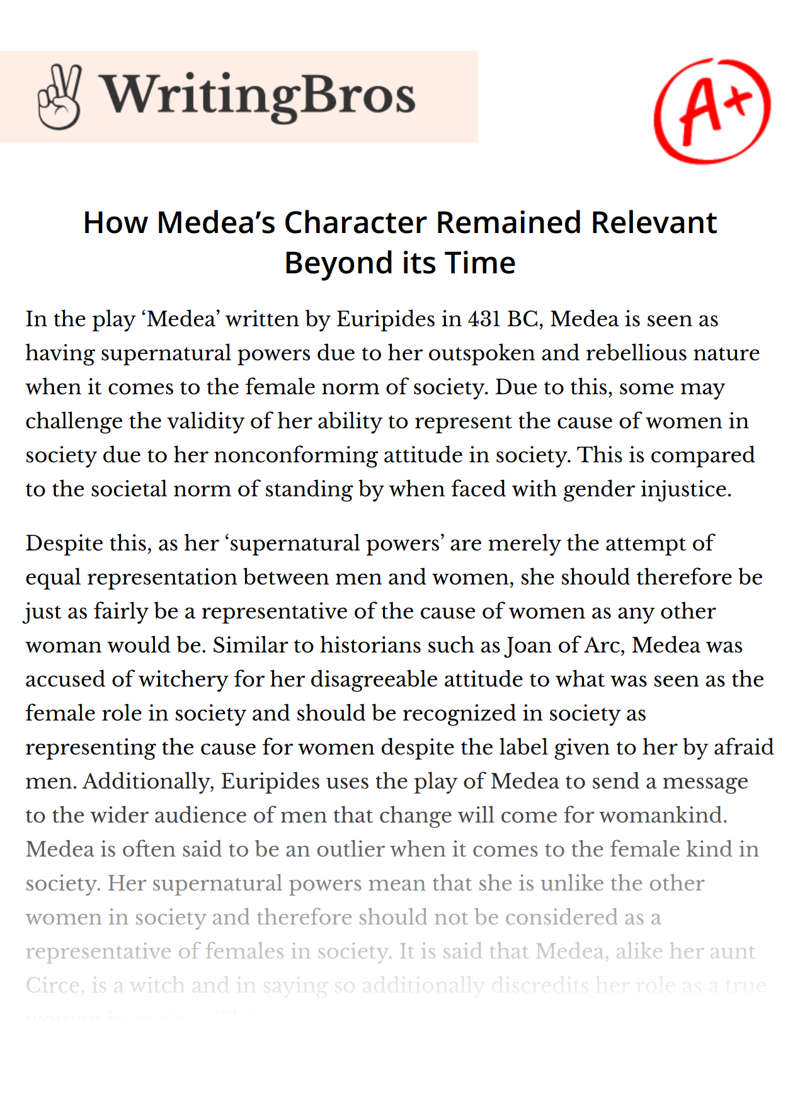How Medea’s Character Remained Relevant Beyond its Time

In the play ‘Medea’ written by Euripides in 431 BC, Medea is seen as having supernatural powers due to her outspoken and rebellious nature when it comes to the female norm of society. Due to this, some may challenge the validity of her ability to represent the cause of women in society due to her nonconforming attitude in society. This is compared to the societal norm of standing by when faced with gender injustice.
Despite this, as her ‘supernatural powers’ are merely the attempt of equal representation between men and women, she should therefore be just as fairly be a representative of the cause of women as any other woman would be. Similar to historians such as Joan of Arc, Medea was accused of witchery for her disagreeable attitude to what was seen as the female role in society and should be recognized in society as representing the cause for women despite the label given to her by afraid men. Additionally, Euripides uses the play of Medea to send a message to the wider audience of men that change will come for womankind. Medea is often said to be an outlier when it comes to the female kind in society. Her supernatural powers mean that she is unlike the other women in society and therefore should not be considered as a representative of females in society. It is said that Medea, alike her aunt Circe, is a witch and in saying so additionally discredits her role as a true woman in society. This is especially exemplified through her feelings toward childbirth; an especially crucial role of women in ancient Greece. She states “I would rather face the enemy three times over than bear a child once.” and in doing so discards the sacredness of childbirth and does not conform to arguably the single most import role of the female in ancient greek society. Her refusal of such a basic principle of being a woman questions her ability to be a representation of the cause of women.
Medea’s Character remained relevant beyond its time through historians that were punished for being outspoken about the injustice between men and women in society. An example of this was Joan of Arc who was present in society long after Medea but attributes similar characteristics to the protagonist herself. Joan of Arc led the French army to the besieged city of Orléans, where it achieved a momentous victory over the English and their French allies, the Burgundians. As she becomes more powerful, many men feared the security of their own positions and sent Joan of Arc to trial to answer to some 70 charges against her, including witchcraft, heresy and dressing like a man. Similarly, it is just as likely that the labels given to Medea including her practice of witchcraft, are just an eager attempt of men to rectify the shift in societal norms and regain their command of women by discrediting Medea herself.
The accusation of practicing witchcraft is therefore just an attempt for men in society to regain power over disagreeable women through punishment and shows how despite being labeled a ‘witch’ Medea is rather an influential and high-powered woman of society and has a crucial part in fighting for the cause of women.It is impossible to say that Medea did not represent the cause of women to some degree as although in the play Medea may have been unable to be considered a woman in society, the audience of the play in 431 BC performed in ancient Greece was entirely men. This was due to women being unable to indulge in activities such as plays and demonstrates the imbalance present in the audience of the play as well as in Medea’s society. Euripides gives a voice to the subdued gender of women and demonstrates the potential of women in society as strong and powerful beings rather than that of a lesser gender that is seen to be created to perform tasks of lesser quality and more mundane form than that of men. Additionally, the play poses a future for women demonstrated through the song of the chorus as “Recompense is coming for the female sex”. To an audience of all men, phrases like these are challenging what is normal in a society ruled by men.
The play itself embodies the fight of a woman, regardless of supernatural powers, to have a wider effect on the audience it was presented to and to represent the cause of women external to the play. To conclude, although some may say that her supernatural powers disallow her to be a representative of the female cause, she ultimately has to be considered as a figure of the female kind as she embodies an outspoken activist for the cause of women both in the setting of the play and externally. Her figure in the play is also comparable to many historians beyond her time that were similarly labeled to discredit them to Euripides uses the play of Medea to send a message to the wider audience of men that change will come for the female gender.
Cite this Essay
To export a reference to this article please select a referencing style below

